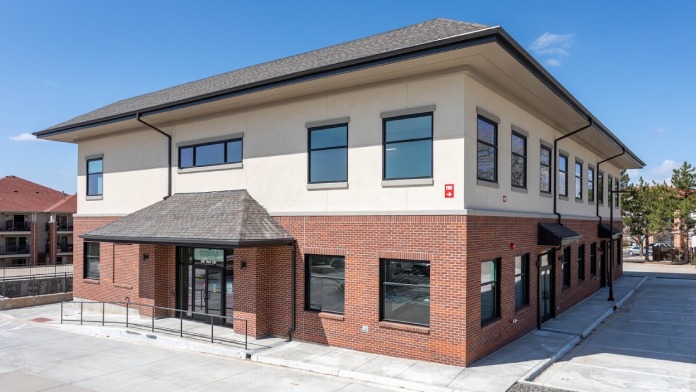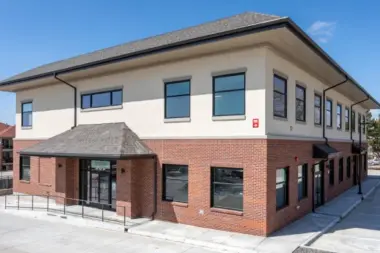Everything about this place is incredible; the staff, the environment, the way of working they have, everything is ideal for active recovery.
About Clinica Family Health and Wellness — Broomfield Clinic
Mental Health Partners in Broomfield, Colorado, is now Clinica Family Health and Wellness. This is a community focused organization that helps individuals, adolescents, and families navigate complex emotional struggles they might be facing. They also have several treatment programs if you have a substance use disorder.
Care is offered in an outpatient setting here. Along with policies from most major insurance providers, they also accept Medicaid and Medicare plans. Financial assistance is available if you are uninsured.
As an outpatient clinic, you’ll find comprehensive counseling services offered in an inviting and supportive recovery setting. Peer support services are also offered through this location.
Screening, Brief Intervention, Referral to Treatment
Helping reach you where you’re at in your journey to recovery, I find that SBIRT screenings are incredibly supportive for those who are unsure where to start with support.
These screenings are helpful for individuals who know they have a problem with substance use but are unsure how to start treatment. It’s also supportive for those who are facing challenges with substance use or their mental health but don’t yet have a diagnosis.
These screenings are offered to you free of charge and can be a life changing starting point in helping you get the appropriate care you need for your life circumstances.
Jail-Based Services
Another aspect of this organization that stands out to me is their jail based services that extend to individuals who are incarcerated but might be struggling with a mental health or a co-occurring substance use disorder.
This program helps support inmates by giving them the opportunity to build life skills and healthy habits and learn how to manage and control complex emotions and feelings. While treatment happens in a jail or prison facility, family members and other loved ones can be supported throughout this journey as well through counseling at the Broomfield clinic.
Latest Reviews
We appreciate you taking the time to share this and wish you continued healing and support in your ongoing care.
We are sorry to hear that your experience with case management left you feeling unheard and stuck. We are committed to continually improving our services, including how we support individuals through case management, and your feedback makes this possible.
We invite and encourage you to contact our Client and Family Advocate to confidentially discuss your experiences and share any suggestions you may have by calling our Advocacy phone number at (303) 413-6284 or emailing advocacyforclients@mhpcolorado.org. For additional information, please visit: https://mhpcolorado.org/advocacy
We are grateful for your time and vulnerability in sharing, and we look forward to speaking with you.
Rehab Score
Gallery


Accepted Insurance
Other Forms of Payment
Medicaid is a state based program that helps lower-income individuals and families pay for healthcare. Medicaid covers addiction treatment so those enrolled can use their coverage to pay for rehab. When a program accepts Medicaid the client often pays very little or nothing out of their own pocket.
Private insurance refers to any kind of healthcare coverage that isn't from the state or federal government. This includes individual and family plans offered by an employer or purchased from the Insurance Marketplace. Every plan will have different requirements and out of pocket costs so be sure to get the full details before you start treatment.
Self-pay involves paying for treatment out of your own pocket. You can use savings or credit, get a personal loan, or receive help from family and friends to fund your treatment. If you don't have insurance or your insurance plan doesn't cover a specific program, self-pay can help ensure you still get the care you need.
Financial aid can take many forms. Centers may have grants or scholarships available to clients who meet eligibility requirements. Programs that receive SAMHSA grants may have financial aid available for those who need treatment as well. Grants and scholarships can help you pai for treatment without having to repay.
Sliding scale payments are based on a client's income and family size. The goal is to make treatment affordable to everyone. By taking these factors into account, addiction recovery care providers help ensure that your treatment does not become a financial burden to you or your family, eliminating one barrier to care.
Medicare is a federal program that provides health insurance for those 65 and older. It also serves people under 65 with chronic and disabling health challenges. To use Medicare for addiction treatment you need to find a program that accepts Medicare and is in network with your plan. Out of pocket costs and preauthorization requirements vary, so always check with your provider.
Addiction Treatments
Levels of Care
Outpatient Programs (OP) are for those seeking mental rehab or drug rehab, but who also stay at home every night. The main difference between outpatient treatment (OP) and intensive outpatient treatment (IOP) lies in the amount of hours the patient spends at the facility. Most of the time an outpatient program is designed for someone who has completed an inpatient stay and is looking to continue their growth in recovery. Outpatient is not meant to be the starting point, it is commonly referred to as aftercare.
Treatments
Mental health rehabs focus on helping individuals recover from mental illnesses like bipolar disorder, clinical depression, anxiety disorders, schizophrenia, and more. Mental health professionals at these facilities are trained to understand and treat mental health issues, both in individual and group settings.
Programs
Adult rehab programs include therapies tailored to each client's specific needs, goals, and recovery progress. They are tailored to the specific challenges adult clients may face, including family and work pressures and commitments. From inpatient and residential treatment to various levels of outpatient services, there are many options available. Some facilities also help adults work through co-occurring conditions, like anxiety, that can accompany addiction.
Young adulthood can be an exciting, yet difficult, time of transition. Individuals in their late teens to mid-20s face unique stressors related to school, jobs, families, and social circles, which can lead to a rise in substance use. Rehab centers with dedicated young adult programs will include activities and amenities that cater to this age group, with an emphasis on specialized counseling, peer socialization, and ongoing aftercare.
Clinical Services
Cognitive Behavioral Therapy (CBT) is a therapy modality that focuses on the relationship between one's thoughts, feelings, and behaviors. It is used to establish and allow for healthy responses to thoughts and feelings (instead of unhealthy responses, like using drugs or alcohol). CBT has been proven effective for recovering addicts of all kinds, and is used to strengthen a patient's own self-awareness and ability to self-regulate. CBT allows individuals to monitor their own emotional state, become more adept at communicating with others, and manage stress without needing to engage in substance abuse.
Whether a marriage or other committed relationship, an intimate partnership is one of the most important aspects of a person's life. Drug and alcohol addiction affects both members of a couple in deep and meaningful ways, as does rehab and recovery. Couples therapy and other couples-focused treatment programs are significant parts of exploring triggers of addiction, as well as learning how to build healthy patterns to support ongoing sobriety.
Dialectical Behavior Therapy (DBT) is a modified form of Cognitive Behavioral Therapy (CBT), a treatment designed to help people understand and ultimately affect the relationship between their thoughts, feelings, and behaviors. DBT is often used for individuals who struggle with self-harm behaviors, such as self-mutilation (cutting) and suicidal thoughts, urges, or attempts. It has been proven clinically effective for those who struggle with out-of-control emotions and mental health illnesses like Borderline Personality Disorder.
Experiential therapy is a form of therapy in which clients are encouraged to surface and work through subconscious issues by engaging in real-time experiences. Experiential therapy departs from traditional talk therapy by involving the body, and having clients engage in activities, movements, and physical and emotional expression. This can involve role-play or using props (which can include other people). Experiential therapy can help people process trauma, memories, and emotion quickly, deeply, and in a lasting fashion, leading to substantial and impactful healing.
Research clearly demonstrates that recovery is far more successful and sustainable when loved ones like family members participate in rehab and substance abuse treatment. Genetic factors may be at play when it comes to drug and alcohol addiction, as well as mental health issues. Family dynamics often play a critical role in addiction triggers, and if properly educated, family members can be a strong source of support when it comes to rehabilitation.
Group therapy is any therapeutic work that happens in a group (not one-on-one). There are a number of different group therapy modalities, including support groups, experiential therapy, psycho-education, and more. Group therapy involves treatment as well as processing interaction between group members.
In individual therapy, a patient meets one-on-one with a trained psychologist or counselor. Therapy is a pivotal part of effective substance abuse treatment, as it often covers root causes of addiction, including challenges faced by the patient in their social, family, and work/school life.
Trauma therapy addresses traumatic incidents from a client's past that are likely affecting their present-day experience. Trauma is often one of the primary triggers and potential causes of addiction, and can stem from child sexual abuse, domestic violence, having a parent with a mental illness, losing one or both parents at a young age, teenage or adult sexual assault, or any number of other factors. The purpose of trauma therapy is to allow a patient to process trauma and move through and past it, with the help of trained and compassionate mental health professionals.
Staff
McFredericks Edache
CEO
Dixie Casford
Co-CEO
Don Dufoe
Owner
Erin Boudreau
Executive Director
Karen Rice
Chief Medical Officer
Vicki Rodgers
COO & Chief Corporate Integrity Officer
Fred Michel
CMO
Naida Haddad
Medical Director
Contact Information
899 U.S. Highway 287
Suite 300
Broomfield, CO 80020




